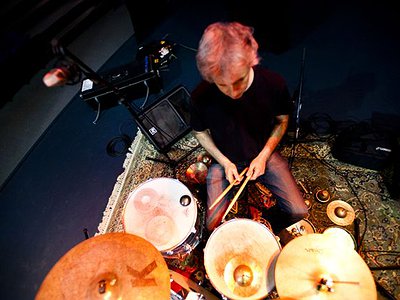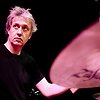Listening is also an active, rather than just a passive process. How do you see the role of the listener in the musical communication process?
This depends on the context or the intended purpose of the music. In many music-making situations there is a constant feedback loop between performers and listeners, applause, coded responses etc. Information goes back and forth, contributing to some sense of the success or otherwise of the particular situation. People dance to dance music, or not. Some people engage with something while others not. Memory and meaning play into all these things.
Music sounds different to different people, in different parts of the room depending on so many factors. There is never really one version of the music that's the same for everyone.
Strangely, when The Necks were formed, in the initial period of development, it was very important that the audience was taken out of the equation for us. We were developing a way of playing together that was focused on the process rather than the product; a way of playing where there was absolutely no question of having to entertain or maintain interest for a listener, outside of the three of us.
How do you see the relationship between music and other forms of art – painting, video art and cinema most importantly - and in how far, do you feel, does music relate to other senses than hearing alone?
I feel music is connected to other art forms as it is obviously a creative activity communicating various notions and impressions of this human condition. At the same time there are specific aspects of music making that are unique to it. Music is a time-based medium so of course there are aspects that tie it to other time based arts, like cinema. But in reality all art-making takes time and so reflects aspects of this, even if this isn't perhaps the most obvious aspect of the work. A finished painting reflects the history of its making.
Hearing music is only one way of appreciating its meaning. It’s a physical, hugely psychological process, a gestural process and a vibrational process. It can act as a signifier and codifier of many cultural and social interactions and associations. Music is so much more than sound alone.
Reaching audiences usually involves reaching out to the press and possibly working with a PR company. What's your perspective on the promo system? In which way do music journalism and PR companies change the way music is perceived by the public?
While I concede that PR, promotion and publicity are important tools to get the music out there, I am not very good at it and would often times prefer to ignore these things. It's important to have releases reviewed, as much for promotion as well as a way of gaining some idea of how the music is coming across.
Of course music in its many guises mean different things to different people and this has as much to do with other things other than the sound of the music itself. Music is a social activity but also a tool used to identify social groups, tribes, ideologies and social activities. How the music is promoted can greatly influence how the music is perceived and what it means. Music is often tied in with and promoted alongside other things like fashion and dance; to sell products and as an adjunct to lifestyle, and aimed at certain social groups and cliques. It would be stupid to ignore this but somehow I’d much rather just get on with playing.
Do you have a musical vision that you haven't been able to realise for technical or financial reasons – or an idea of what music itself could be beyond its current form?
I’ve always been attracted to the idea of a music or performance that is a blend of sound and vision, spectacle. Theatre, yet at the same time an act of communal freedom and a casual ‘everyday-ness’ that is the opposite of any theatrical pretence.
I would love to create a setting or ensemble that tries to explore this idea. The main thing that gets in the way of pursuing this is finding context and time and the financial means. It would have to develop quite organically and socially I think and finding a way to do this is difficult. Finding the right people with a similar vision is difficult. Still, I feel sometimes I am working slowly towards finding a way to at least explore some of these ideas and of reconciling some of those contrasting or even contradictory approaches to music-making I spoke of earlier.




